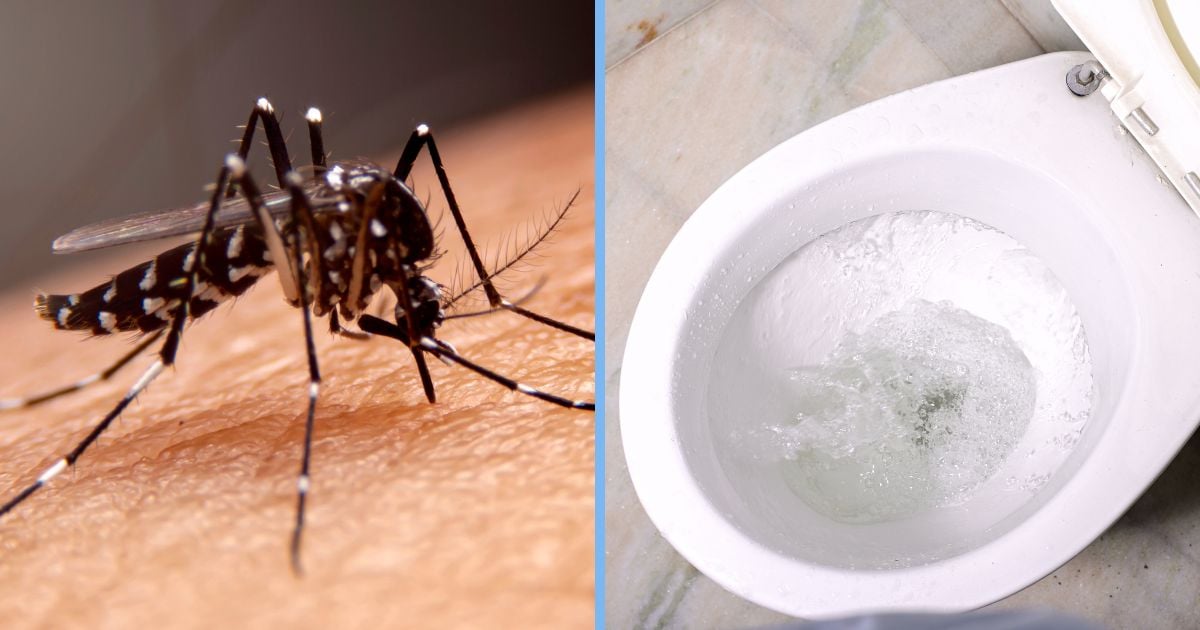To prevent dengue outbreaks at home, we are regularly advised to take specific measures such as discarding stagnant water, covering gully traps and bamboo pole holders and changing water in flower vases on a regular basis.
There can’t be any other peculiar spots at home where mosquito could potentially breed, right?
Surprisingly, it is indeed possible for these pesky insects to find a breeding haven even in our toilet bowls. Quite unsettling, isn’t it?
This incident revolves around Koh Ee Sian, who was accused of enabling mosquito breeding in a toilet bowl in her flat in May 2022.
Koh adamantly denied these allegations and chose to stand trial for the charge of creating favourable conditions for mosquito breeding within her toilet bowl.
Mosquito Larvae Found in Toilet Bowl
The disturbing discovery of mosquitoe larvae in her toilet bowl came to light when two officers from the National Environment Agency (NEA) paid a visit to Koh’s flat after a dengue outbreak was reported within the estate.
During their routine inspection, the officers stumbled upon mosquito breeding, specifically Aedes larvae, in the master bedroom’s toilet.
Now, you might wonder how Koh could have possibly ignored such mosquito breeding in her home. Her defence was that resided next door and did not use that toilet since she was waiting for tenants to move in.
In her self-representation in court, Koh claimed that the officers took a big bag of detergent and poured it into the toilet bowl. NEA prosecutor, Harvinder Kaur, mentioned that the officers had initially asked Koh for Clorox and detergent to get rid of the breeding habitat, but she claimed she had none and refused to kill the mosquitoes, citing her religious beliefs.
When the officers asked Koh if she had boiling water, she simply handed them a kettle, reiterating her religious objection to killing animals. Consequently, the officers had to take matters into their own hands, boiling the water themselves and pouring it down the toilet bowl. They instructed Koh to flush the toilet after 15 to 30 minutes once they had departed.
The officers collected a breeding sample from the toilet bowl and found mosquito breeding of the Aedes species, specifically Dengue, chikungunya and zika, at larval stage 4.
Aedes mosquitoes breeding is known to occur in about a week. To give you a better understanding of the timeline, NEA states that the egg of an Aedes mosquito can hatch into a larva in less than a day. This larva would develop into a pupa over approximately four days before emerging as an an adult mosquito within two days.
If infected, these mosquito-borne diseases can result in symptoms such as fever, skin rashes, joint and muscle pain and if severe, even fatalities.
Koh’s Arguments and the Court’s Verdict
Koh was initially offered a fine of S$200 but refused to pay arguing that she did not create conditions favourable to mosquito breeding.
She contended that she had diligently followed NEA’s guidelines for preventing mosquito breeding at home and placed blame on NEA for not explicitly mentioning that mosquitoes could breed in toilet bowls. Koh even questioned why NEA had not advised on the necessity of cleaning and maintaining toilet bowls.
Does NEA really have to tell you to clean your toilet bowl…?
NEA prosecutor, Ms Kaur, dismissed Koh’s arguments as absurd, emphasising that no larvae would be present if a toilet bowl is flushed and cleaned every day.
Koh, however, considered herself a “victim” since her area was a dengue cluster and said that she did not know where the mosquitoes came from. She felt that she should not be held accountable, as she believed the mosquitoes had simply flown into her home.
District Judge Brenda Chua did not buy into Koh’s justification, asserting that Koh was wrong to attribute the offense to the mosquitoes rather than herself. Furthermore, the judge underscored the dangerous precedent that would be set if everyone adopted Koh’s reasoning, as it would lead to rapid mosquito breeding in households.
Consequently, the prosecution sought a fine of S$1,500 and the judge eventually imposed a fine of S$1400, which Koh later paid.
Had she simply paid the initial fine, she could have saved over S$1,000.
To prevent mosquito breeding, especially in light of the 236 reported dengue cases in the week of December 23rd, 2023 (26 more than the previous week), it is crucial to adhere to the NEA’s “B-L-O-C-K” steps:
- Break up hardened soil
- Lift and empty flowerpot plates
- Overturn pails and wipe their rims
- Change water in vases
- Keep roof gutters clear and place BTI insecticide inside
For a more comprehensive set of instructions, you can refer to NEA’s official guideline.
Finally, don’t forget the simplest preventive measure of all – regularly flush and clean your toilet bowls.



